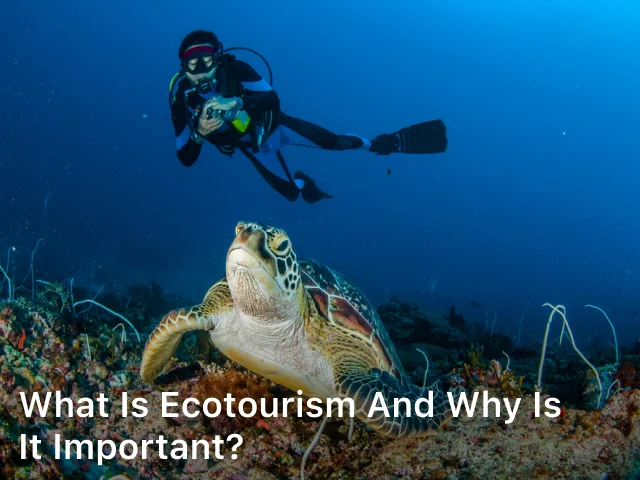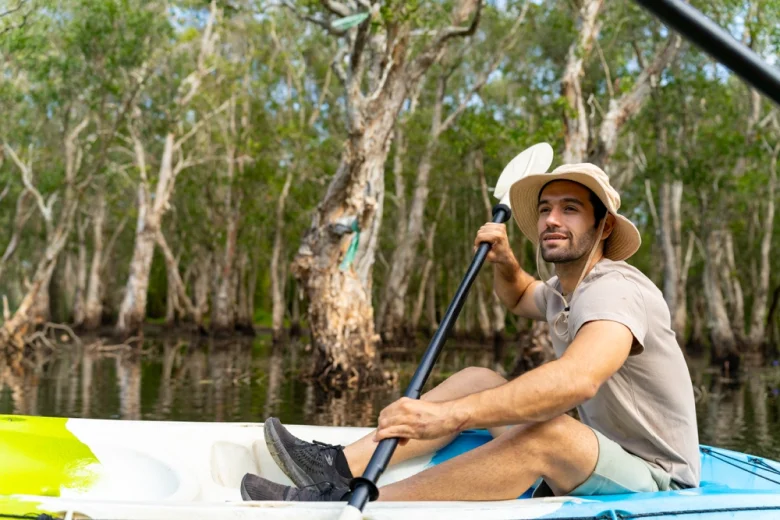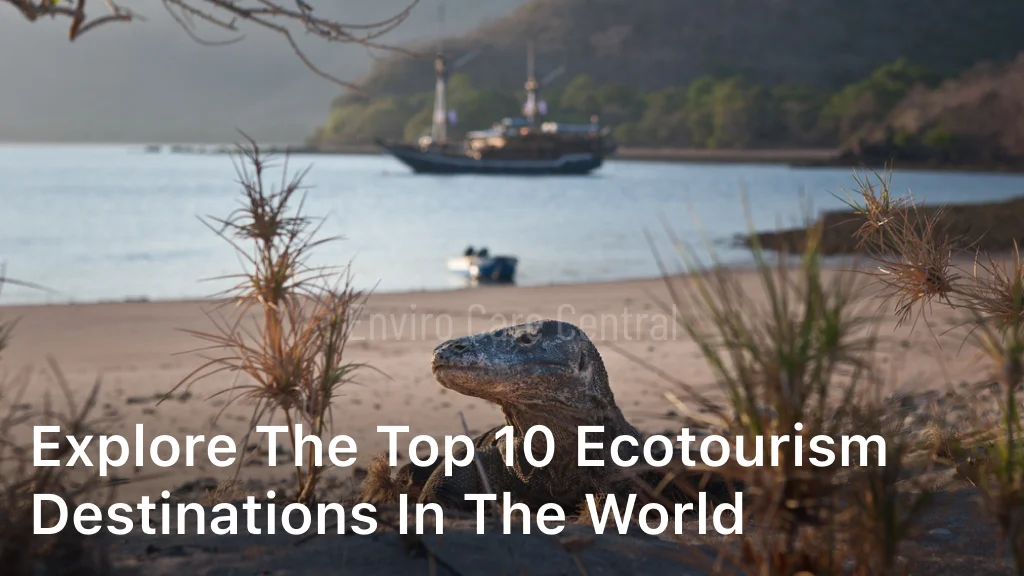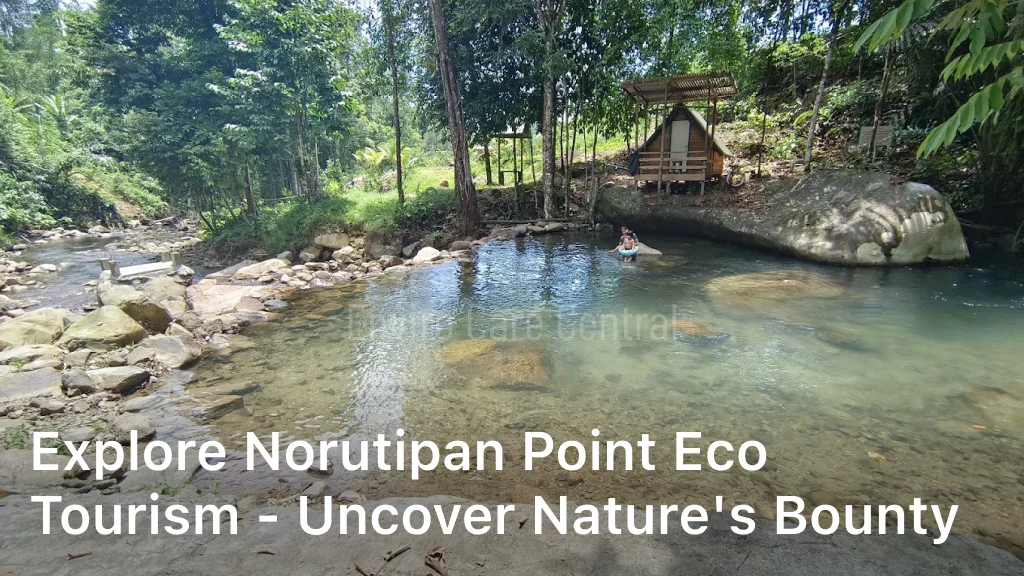What is Ecotourism and Why is it Important?

What is Ecotourism and Why is it Important? Explore the world of ecotourism and discover why it’s crucial for our planet’s future. Learn what ecotourism is, its importance, and how it benefits both nature and communities.
Ecotourism is a term that has been gaining increasing attention in recent years. But what exactly is ecotourism, and why is it important? In this article, we will delve deep into the world of ecotourism, exploring its meaning, significance, and the positive impact it has on the environment and local communities.
What is Ecotourism?
Ecotourism is a dynamic and responsible approach to travel that combines the exploration of natural environments with an unwavering commitment to preserving and protecting those ecosystems.
Unlike conventional tourism, which can often have detrimental effects on the environment and local communities, ecotourism is designed to be sustainable, educational, and environmentally conscious.
One of the defining characteristics is its emphasis on the natural world. Travelers who embark on ecotourism journeys are driven by a desire to connect with nature, understand its intricate web of life, and appreciate the beauty of the outdoors.

This can involve activities such as hiking through pristine forests, observing wildlife in their natural habitats, birdwatching, snorkeling in coral reefs, or stargazing in remote, pollution-free areas. It’s a chance to escape the hustle and bustle of urban life and immerse oneself in the wonders of the natural world.
However, ecotourism is not solely about personal enjoyment and exploration; it goes beyond that. It is a form of tourism with a conscience. Travelers who engage in understand that their actions can have far-reaching consequences, both positive and negative.
Therefore, they actively seek to minimize their environmental footprint and ensure that their presence has a positive impact on the ecosystems they visit.
In ecotourism, the protection and conservation of biodiversity are paramount. Many destinations are havens for rare and endangered species, and visitors play a crucial role in their conservation efforts.
Whether it’s observing sea turtles nesting on a beach, tracking a family of mountain gorillas in the misty forests of Africa, or admiring the vibrant colors of tropical birds in the rainforest canopy, ecotourists are contributing to the preservation of these species and their habitats.
Furthermore, ecotourism is closely linked to the empowerment of local communities. It often takes place in areas where indigenous or local people reside, and these communities are actively involved in initiatives.
By participating, travelers provide opportunities to these communities, support local businesses, and help maintain the traditional cultures and lifestyles of the people who call these natural wonders their home.
In essence, is a harmonious blend of adventure, education, and environmental stewardship. It enables travelers to learn about the intricate relationships that govern our planet, promotes a deeper understanding of the importance of conservation, and directly contributes to the preservation of some of the world’s most treasured natural treasures.
As an eco-conscious form of travel, is more than just a passing trend; it is a way of connecting with our planet and ensuring that future generations can enjoy the same natural wonders that captivate us today.
Why is Ecotourism Important?
Ecotourism is important for several compelling reasons, as it plays a pivotal role in addressing critical environmental and social challenges facing our world today. Let’s delve into the significance of ecotourism:
- Conservation of Biodiversity: One of the foremost reasons why ecotourism is crucial is its direct contribution to the conservation of biodiversity. Ecotourism destinations are often situated in areas of high ecological importance, home to rare and endangered species. By attracting visitors to these areas, it generates funding for conservation efforts and encourages the protection of these delicate ecosystems.
- Preservation of Natural Ecosystems: Ecotourism promotes the preservation of natural ecosystems. Many of these destinations are designated as protected areas or national parks, where strict regulations and responsible management ensure the sustainable coexistence of wildlife, ecosystems, and human visitors.
- Economic Empowerment of Local Communities: Ecotourism provides economic opportunities for local communities residing in or near these natural wonders. They can benefit from jobs in guiding, accommodations, and the sale of locally-made products. This empowerment often deters unsustainable practices like logging or poaching, as communities recognize the value of preserving their environment.
- Cultural Exchange and Preservation: In many ecotourism destinations, travelers have the chance to engage with indigenous or local communities. This not only enriches the travel experience by providing insights into unique cultures and traditions but also encourages the preservation of these cultures, as they become economically linked to the ecotourism industry.
- Promotion of Environmental Awareness: Ecotourism fosters a deep and lasting connection between travelers and the natural world. Through first-hand experiences, such as wildlife encounters and immersive nature exploration, visitors gain a heightened appreciation for the environment and its delicate balance. This, in turn, increases environmental awareness and encourages individuals to become advocates for nature conservation.
- Mitigation of Climate Change: Ecotourism often takes place in carbon-rich environments like forests, wetlands, and coastal areas. By supporting the protection and sustainable management of these areas, ecotourism plays a role in mitigating climate change. Healthy ecosystems act as carbon sinks, helping to reduce greenhouse gas emissions and combat global warming.
- Scientific Research and Education: Many ecotourism initiatives support scientific research. Researchers and educators often work closely with ecotourism operations to study wildlife, habitats, and environmental changes. This not only advances our understanding of the natural world but also allows for the dissemination of knowledge to the general public.
- Sustainable Tourism Practices: The principles of ecotourism encourage responsible travel behaviors, such as minimizing waste, conserving resources, and supporting eco-friendly accommodations. These practices set a positive example for the broader tourism industry, inspiring the adoption of more sustainable approaches to travel.
Ecotourism is important because it represents a unique and effective way to appreciate, protect, and enhance our natural world. It simultaneously benefits the environment, local communities, and travelers themselves by fostering a profound connection to nature and a commitment to its preservation.
By choosing ecotourism, individuals become stewards of the planet, ensuring that these irreplaceable natural treasures endure for generations to come.
Keep Reading : Overlook Mountain Hiking is The Best Place to Hike
The Benefits of Ecotourism
Ecotourism, as an environmentally and socially responsible form of travel, offers a wide array of benefits that extend beyond the individual traveler’s experience.
Let’s explore the various advantages of ecotourism:
- Preservation of Natural Ecosystems: Ecotourism often takes place in areas of remarkable natural beauty and ecological significance. By attracting visitors, it incentivizes the protection and conservation of these pristine environments. Without ecotourism, many of these areas might be under threat from development, logging, or other forms of exploitation.
- Conservation of Biodiversity: Ecotourism destinations are frequently hotspots for biodiversity, serving as habitats for rare and endangered species. The revenue generated from ecotourism supports vital conservation efforts, including the preservation of these species and their natural habitats.
- Promotion of Environmental Awareness: Ecotourism offers travelers a chance to engage with the natural world on a personal level. Through activities like wildlife observation, hiking, and environmental education, it fosters a deeper understanding of the environment and encourages greater environmental awareness. This, in turn, can lead to more environmentally conscious behavior in all aspects of life.
- Economic Benefits for Local Communities: Local communities living in or near ecotourism destinations often benefit from the industry. The creation of jobs in guiding, accommodations, and the sale of local products provides economic stability. This not only reduces poverty but also empowers these communities to protect their natural resources and cultural heritage.
- Cultural Exchange and Preservation: Many ecotourism experiences involve interactions with indigenous or local communities. This promotes cultural exchange and understanding. It also contributes to the preservation of traditional cultures and lifestyles, as the economic value of these cultures becomes evident through tourism.
- Scientific Research and Education: Ecotourism can facilitate scientific research and educational opportunities. Researchers and educators often collaborate with ecotourism operators to study wildlife, ecosystems, and environmental changes. This partnership enhances our understanding of the natural world and allows for the dissemination of knowledge to the public.
- Economic Diversification: In regions heavily reliant on a single industry, such as mining or logging, ecotourism provides a valuable source of economic diversification. This can reduce the vulnerability of these communities to economic downturns and promote more sustainable livelihoods.
- Support for Sustainable Practices: Ecotourism sets a positive example for the broader tourism industry. The principles of ecotourism, such as minimizing waste, conserving resources, and supporting eco-friendly accommodations, encourage the adoption of more sustainable travel practices across the tourism sector.
- Mitigation of Climate Change: Many ecotourism destinations are located in carbon-rich environments like forests and wetlands. By supporting the protection and sustainable management of these areas, ecotourism plays a role in mitigating climate change. Healthy ecosystems act as carbon sinks, helping to reduce greenhouse gas emissions and combat global warming.
- Personal Fulfillment: For travelers, ecotourism provides a unique and enriching experience. It offers the opportunity to connect with nature, explore breathtaking landscapes, and create lasting memories. The knowledge that their travel choices contribute to conservation and community development can enhance the sense of personal fulfillment.
Ecotourism offers a multitude of benefits, ranging from environmental preservation and biodiversity conservation to economic empowerment and cultural exchange.
It is a holistic approach to travel that not only enriches the traveler but also ensures the sustainable future of our planet’s natural treasures and the well-being of the communities that call them home.
Keep Reading : Safari Outdoor Adventure Park, The Best Park for Ecotourism
Conclusion
In conclusion, ecotourism is not just a passing trend; it is a profound and purposeful way of experiencing the world around us. This sustainable form of travel combines adventure, education, and environmental stewardship to create a unique and meaningful journey. The importance of ecotourism cannot be overstated, as it brings with it a host of benefits that reach far beyond the individual traveler.
We engage with the natural world in a manner that fosters a deep appreciation for its beauty and intricacies. We explore pristine landscapes, observe wildlife in their natural habitats, and immerse ourselves in environments of unparalleled biodiversity. Simultaneously, we contribute to the preservation of these ecosystems and the conservation of endangered species.
Ecotourism is more than just a means of connecting with nature; it is a conduit for the preservation of our planet’s natural wonders. It empowers local communities economically, encourages the protection of cultural heritage, and supports conservation efforts. By participating, we strengthen the bond between humanity and the environment, ensuring that both can thrive harmoniously.
This responsible form of travel also serves as an education platform, deepening our understanding of environmental issues and inspiring greater environmental consciousness. As travelers return from their journeys, they often carry with them a commitment to sustainable practices and a desire to be advocates for our planet.
Furthermore, ecotourism is a beacon for sustainable tourism practices, setting an example for the broader travel industry. Its principles of minimizing environmental impact, conserving resources, and supporting local communities provide a framework for a more responsible and eco-friendly future of travel.
Ultimately is a multifaceted approach that contributes to the well-being of our environment, the prosperity of local communities, and the enrichment of the traveler’s soul.
By choosing ecotourism, we embark on a journey of purpose and responsibility, ensuring that the wonders of our planet remain for future generations to explore and cherish. It is a testament to our commitment to preserving the Earth’s natural treasures and the cultures that call them home.





